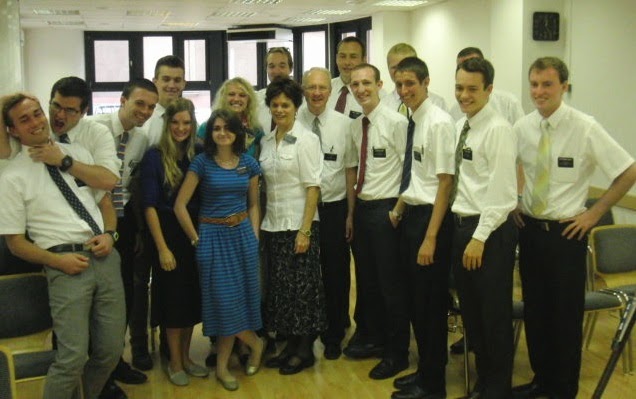 |
| Stan saw 'fried clod' on the menu and was curious. It was a breaded piece of pork served over potatoes. I liked the carrot flower which was also on my vegetable plate (but that picture is blurry). |
The temperature is supposed to reach 800
today. That’s probably a high for us in
August!
The weeks keep flying by.
Monday night we had a good home evening – 3 members, 1 investigator and
4 missionaries. They fill our little
house, but that is good. One young
sister reported on attending a central Europe YSA conference in Poland. Besides several mishaps with the train going
and coming to Budapest, the bus going to Poland and a window breaking in her
hotel room, she had a great experience -- meeting many other Young Single Adult
members, attending classes, learning, hearing Sister Elaine Dalton and enjoying
the social events.
We made a quick trip to Budapest this week to make a payment
on an order for a project (remember, things must be paid in cash up front),
picked up items for two other projects and then headed home through other
cities where we needed to stop.
First stop was in Székesféhervár where we stopped to ‘close’ a project, which was this therapy bed for the county home for disabled adults. Here we encountered a new problem. The director is not happy with the bed. It is the standard size, but she wanted it 20 cm narrower. So, we are not through with this project and are still a bit unsure how this will be solved. Anyone need a rather expensive, custom-made, electrically adjustable therapy bed?
Next was Tatabánya where we presented three three-tiered serving carts (you can see the top of one) to a home for the elderly. They will use these for delivering medicines and meals to the residents of their facility who cannot leave their rooms.
We then took ping pong paddles and balls to a day care for disabled adults to go with a ping pong table that was delivered last week. Their handy man was to arrive later in the day to finish setting up the table; the residents, holding their paddles, were ready to play and looked forward to some physical activity. The missionaries do service there periodically and said they would go play some games with them.
In Pápa, where we had previously closed a
project, we delivered sheets for the cots at the day care. We had hoped they would be delivered, but the
company called us to say they were ready, and they had no idea when they could
be delivered as they needed more than one delivery to go that direction. Since we had another order at that company
and had to pay in cash, we picked up the sheets and delivered them. They were very excited because on Monday,
their classes will be full.
In the evening inTatabánya we walked around the square and took a picture of the statue of Arpád. Arpád is everywhere in the country – statues, streets, bridges, and buildings. He was the head of the confederation of Hungarian tribes in the 9th and 10th centuries. He is considered by many Hungarians as the ‘founder of the country.’ He is also known as the Grand Prince, and played a prominent role in the Hungarian conquest of the Carpathian Basin; his line ruled the country for 300 years.
Back in Kaposvár we went with the elders to a small village about 40K away
to teach M, an investigator. Normally,
they would not teach someone this far away, but her aunt lives next door and is
a member, and M attended church last week and asked for the missionaries. She will be attending school in another town,
so not sure how much teaching will happen there.
On the way we passed several farm implement dealers with surprisingly large equipment on their lots. We also came upon numerous tractors and equipment driving on the road. True to form, there is the new, . . .
. . .and there
is also the old.
In this little village we drove to the end of a narrow street to turn around at the roundabout, and saw this quaint statue of a farmer and his wife surrounded by a flower garden.
And on the way home, we saw this sign with the old Hungarian language-- it's not backwards. In the small villages, these old names are still posted. This old Hungarian script or alphabetic writing system was used in the Middle Ages.
In this little village we drove to the end of a narrow street to turn around at the roundabout, and saw this quaint statue of a farmer and his wife surrounded by a flower garden.
And on the way home, we saw this sign with the old Hungarian language-- it's not backwards. In the small villages, these old names are still posted. This old Hungarian script or alphabetic writing system was used in the Middle Ages.
Today at church we had several people who have not attended in a long time – a very nice happening, and a full meeting again. The German couple spoke about marriage and eternal families. Interesting, he only speaks German; she speaks a little Hungarian and a little English. So they wrote and gave their talks in German. Prior to today their son translated their talks into English and they gave a copy to Stan and I and the person who used the English to translate into Hungarian for the congregation. Translating makes for interesting meetings; and sometimes we don't get it all.
We have sweet members and are grateful that we can feel the Spirit in spite of language differences. The Gospel is true in any language. We are so grateful for the opportunity to partake of the sacrament and ponder the blessing of our Savior's Atonement for each of us.
Happy Labor Day to All!





























